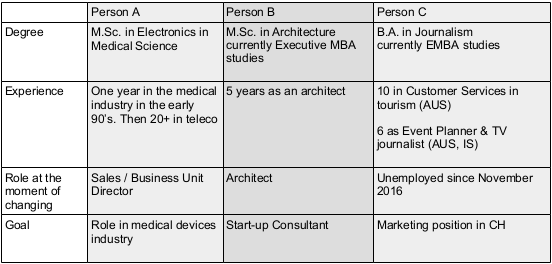How complicated is it to find a new job? It depends. Generally, there are three scenarios that we differentiate when it comes to complexity and duration of the job hunting process:
- Standard: when looking for a job in line with one’s experience, competences and interest
- Medium: when looking for a job in line with one’s competences BUT outside the key industry
- Difficult: looking for a job outside one’s core industry and experience
Here are some real-life examples:
So… where to start when it seems like your desired next position is completely unrelated to what you would like to be doing?
First things first: it is crucial to understand the general mechanisms of the job market and the job search process:
1. Be sure to have a clearly defined goal (job title, company, city / country, scope, etc.)
2. Know your strengths and weaknesses
3. Have impeccable application documents and online presence
4. Be aware that there are four channels to generate job offers: networking, direct application, headhunters and job ads
Goal: motivation check
Prior to getting started, ask yourself why is it that you started to think about a major change in the course of your career in the first place? It is our experience that only (!) 1 in every 10 professionals who communicates that they want to change careers / roles / industries are solidly motivated and have done asked themselves the following questions:
- Why is this important for me?
- Is this really THAT important?
- Can I change something in my current role?
- Maybe it’s time to get a new hobby?
- Could taking a longer vacation be the answer?
In other words: for 9 out of 10 it’s just a phase. It’s a temporary frustration they are experiencing. Or a little bit of day dreaming.
You might simply come to terms with the fact that sometimes change is not the answers.
When you have your motivation sorted out, it is time to start generating satisfying job offers.
Strengths: credibility
If you fall into “Medium” or “Difficult” category of job hunting process, there will be a lot of work to do and the key to success can be summed up in one equation:
Evidence = Credibility
In other words, it’s all about providing recruiters and decision makers with proof that you are equipped in industry- or role-relevant skills and expertise. Sometimes you have to start by producing that evidence first. How?
Evidence-producing activities:
- Additional education (courses, online, studies, …)
- Industry (conferences, networking events, …)
- (Mini) part-time job or role (mentor, volunteer, …)
- Additional projects (in current company, NGO, …)
Documents: relevant & concrete
Depending on how far outside your current scope you are venturing, you might have to completely or partly re-brand / re-position yourself by changing the way you present your experience in your CV. It can involve involve:
- Re-phrasing your profile summary which is, at the end of the day, your Unique Selling Proposition; it’s the reason, the evidence why somebody should spend 15 min talking to you
- Adjusting the language in the CV to ensure it contains language your new target market will be able to understand
- Adapt the CV graphically
Channels
The more difficult the level of the change that you are pursuing the less likely it is that a headhunter or job ad will be the source of a new job offer. Focus on building a network and reaching out to companies and decision makers directly.
The process
Mistakes that we observe job hunters do on a daily basis when it comes to changing roles / industries / careers / profession:
- Too little too late: not preparing enough or implementing the “evidence gathering” too late
- Lack of required language skills: we have asked recruiters in almost all European countries “On a scale from 1-10, how important is it for a job seeker to know the local language when applying”. The average reply was “8”. Far too many job hunters fail as they don’t take that point too seriously
- “I’ll do it, when they want me”: this point plays a little bit into the language part; it’s the thinking, “Oh.. once they hire me, I’ll start learning / I’ll start refreshing.” This is not how it works
- Underestimate involved effort (time, money): depending on the level of complexity, we are talking about making a substantial change in your life. It requires on average 1-2 years
- Not prepared to take a financial cut: in our experience such a change can often mean a financial cut of 25-50% in the first couple of years, as you have to prove yourself again and start at a lower level
- Believing that the exception applies to you: and although we’ve written all the above, there are too many out there who think and truly believe that “this can’t be that difficult”, “I have a great personality”, “I am very determined”, “I learn very quickly”
Your dream job is within your reach, which may not be easy (it might be medium or difficult), but if you implement the aforementioned solutions, it is more than possible.
Are you thinking about changing industries? Roles? Careers? Profession? Would you like to talk about your plans confidentially? Send an email to Bichl.Sandra (at) CareerAngels.eu or click here. Please note: the call of approx. 45 min is confidential, non-obligatory and free of charge.



